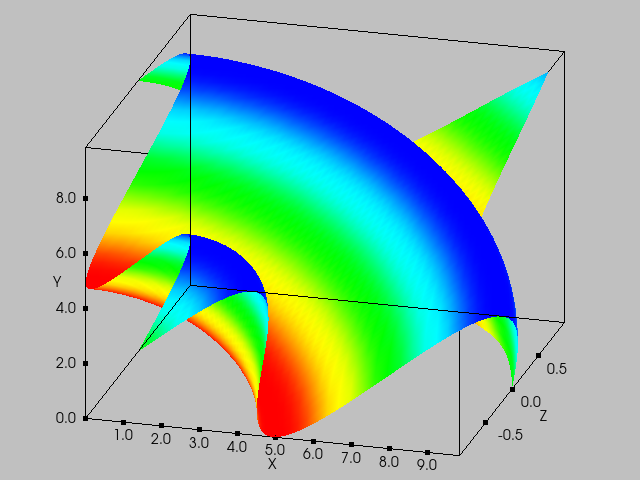SurfacePlot
Repository source: SurfacePlot
Description¶
This examples creates a vtkChartXYZ that contains a vtkPlotSurface.
Other languages
See (Python), (PythonicAPI)
Question
If you have a question about this example, please use the VTK Discourse Forum
Code¶
SurfacePlot.cxx
#include <vtkChartXYZ.h>
#include <vtkContextMouseEvent.h>
#include <vtkContextScene.h>
#include <vtkContextView.h>
#include <vtkFloatArray.h>
#include <vtkNamedColors.h>
#include <vtkNew.h>
#include <vtkPen.h>
#include <vtkPlotSurface.h>
#include <vtkRenderWindow.h>
#include <vtkRenderWindowInteractor.h>
#include <vtkRenderer.h>
#include <vtkTable.h>
#include <vtkVersion.h>
#if VTK_VERSION_NUMBER >= 90220220630ULL
#define VTK_HAS_SETCOLORF 1
#endif
int main(int, char*[])
{
vtkNew<vtkNamedColors> colors;
vtkNew<vtkChartXYZ> chart;
chart->SetGeometry(vtkRectf(10.0, 10.0, 630, 470));
vtkNew<vtkPlotSurface> plot;
vtkNew<vtkContextView> view;
view->GetRenderer()->SetBackground(colors->GetColor3d("Silver").GetData());
view->GetRenderWindow()->SetSize(640, 480);
view->GetScene()->AddItem(chart);
// Create a surface.
vtkNew<vtkTable> table;
vtkIdType numPoints = 70;
float inc = 9.424778 / (numPoints - 1);
for (vtkIdType i = 0; i < numPoints; ++i)
{
vtkNew<vtkFloatArray> arr;
table->AddColumn(arr);
}
table->SetNumberOfRows(static_cast<vtkIdType>(numPoints));
for (vtkIdType i = 0; i < numPoints; ++i)
{
float x = i * inc;
for (vtkIdType j = 0; j < numPoints; ++j)
{
float y = j * inc;
table->SetValue(i, j, sin(sqrt(x * x + y * y)));
}
}
// Set up the surface plot we wish to visualize and add it to the chart.
plot->SetXRange(0, 10.0);
plot->SetYRange(0, 10.0);
plot->SetInputData(table);
#if VTK_HAS_SETCOLORF
plot->GetPen()->SetColorF(colors->GetColor3d("Tomato").GetData());
#else
plot->GetPen()->SetColorF(colors->GetColor3d("Tomato").GetData());
#endif
chart->AddPlot(plot);
view->GetRenderWindow()->SetMultiSamples(0);
view->GetInteractor()->Initialize();
view->GetRenderWindow()->SetWindowName("SurfacePlot");
view->GetRenderWindow()->Render();
// rotate
vtkContextMouseEvent mouseEvent;
mouseEvent.SetInteractor(view->GetInteractor());
vtkVector2i pos;
vtkVector2i lastPos;
mouseEvent.SetButton(vtkContextMouseEvent::LEFT_BUTTON);
lastPos.Set(100, 50);
mouseEvent.SetLastScreenPos(lastPos);
pos.Set(150, 100);
mouseEvent.SetScreenPos(pos);
vtkVector2d sP(pos.Cast<double>().GetData());
vtkVector2d lSP(lastPos.Cast<double>().GetData());
vtkVector2d screenPos(mouseEvent.GetScreenPos().Cast<double>().GetData());
vtkVector2d lastScreenPos(
mouseEvent.GetLastScreenPos().Cast<double>().GetData());
chart->MouseMoveEvent(mouseEvent);
view->GetInteractor()->Start();
return EXIT_SUCCESS;
}
CMakeLists.txt¶
cmake_minimum_required(VERSION 3.12 FATAL_ERROR)
project(SurfacePlot)
find_package(VTK COMPONENTS
ChartsCore
CommonColor
CommonCore
CommonDataModel
InteractionStyle
RenderingContext2D
RenderingContextOpenGL2
RenderingCore
RenderingFreeType
RenderingGL2PSOpenGL2
RenderingOpenGL2
ViewsContext2D
)
if (NOT VTK_FOUND)
message(FATAL_ERROR "SurfacePlot: Unable to find the VTK build folder.")
endif()
# Prevent a "command line is too long" failure in Windows.
set(CMAKE_NINJA_FORCE_RESPONSE_FILE "ON" CACHE BOOL "Force Ninja to use response files.")
add_executable(SurfacePlot MACOSX_BUNDLE SurfacePlot.cxx )
target_link_libraries(SurfacePlot PRIVATE ${VTK_LIBRARIES}
)
# vtk_module_autoinit is needed
vtk_module_autoinit(
TARGETS SurfacePlot
MODULES ${VTK_LIBRARIES}
)
Download and Build SurfacePlot¶
Click here to download SurfacePlot and its CMakeLists.txt file. Once the tarball SurfacePlot.tar has been downloaded and extracted,
cd SurfacePlot/build
If VTK is installed:
cmake ..
If VTK is not installed but compiled on your system, you will need to specify the path to your VTK build:
cmake -DVTK_DIR:PATH=/home/me/vtk_build ..
Build the project:
make
and run it:
./SurfacePlot
WINDOWS USERS
Be sure to add the VTK bin directory to your path. This will resolve the VTK dll's at run time.
